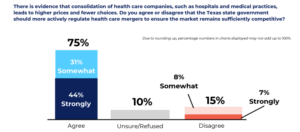2025 Outlook for Employers:
Rising Health Care Expenses. Action at the Capitol.

Employers and employees have been paying more and more every year for employer-sponsored health insurance. When the 89th Texas Legislature convenes next month, Texas Employers for Affordable Health Care will be on the ground at the Texas Capitol fighting for proven strategies to reduce health plan expenses and lower health care prices.
Learn more about what Texas employers are facing, and how we are taking action to address rising health care expenses in The State of Employer-Sponsored Health Care in Texas.
Fierce Healthcare: Employers face yet another year of healthcare cost increases

The Business Group on Health’s annual look at trends to watch notes that healthcare costs are set to increase next year by the largest margin in a decade. And a survey released in September from Mercer found that employers expect costs to go up by 5.8% in 2025, the third straight year with an increase of at least 5%.
HPM: New healthcare poll shows most Texas voters want government regulation for healthcare mergers

“I don’t think that’s reflecting a change away from the competitive free-market values of Texas, but I do think it’s indicative that people are recognizing that healthcare markets are broken and maybe we need some lighter touch regulation to restore that competition,” said Charles Miller, health policy director for Texas 2036.
Wiley: PBM Contracting and Administration: What Are the Rules of the Road for Self-Insured Employees?

No matter the outcome of the Johnson & Johnson case, it is important for plans to be aware of their fiduciary obligations under ERISA as it relates to their pharmacy programs.
CAP: Policies To Combat Anticompetitive Practices in Health Care

Health care markets that lack sufficient competition are ripe environments for providers and payers to extract overly favorable contracting terms. Such terms can impede patient accessaffordability, and quality of care and further perpetuate a concentrated, anticompetitive market.
